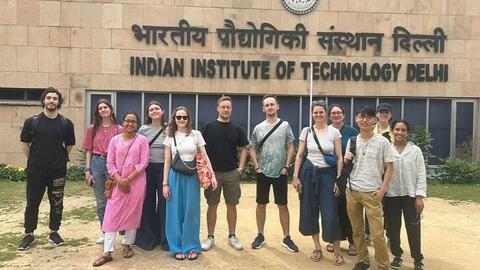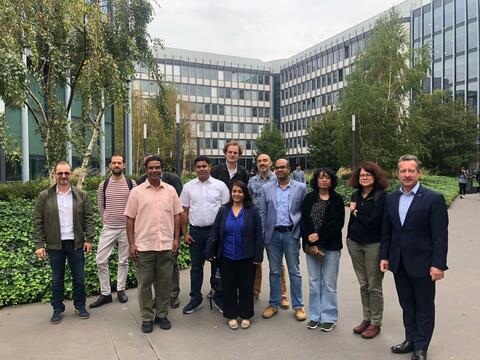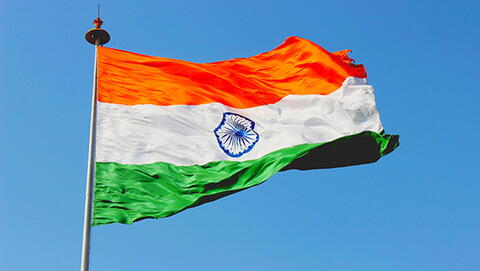
"India and France can learn a lot from each other."
Sorbonne University's Franco-Indian Campus for Health achieved a new milestone earlier this year: its first Spring School. Master's students, doctoral and post-doctoral candidates were hosted by the Indian Institute of Technology Delhi (IITD) for a Spring School centered on training and collaboration.
In our interview, participants Benjamin Flament (pictured: center left) and Konstantin Volzhenin (pictured: center right) reflect on their experiences.
What is your area of expertise?
Benjamin: I'm a PhD student in cognitive neuroscience at the Brain Institute. I specialize in beliefs and how they influence decision-making. I'm trying to understand how adherence to a particular state of mind impacts our decision-making, for example in academic matters, from both a behavioral and neuroanatomical point of view. I participated in the “Health: Perspectives from Humanities and Social & Cognitive Sciences” spring school in India.
Konstantin: I am currently a third-year PhD student working on artificial intelligence models applied to proteomics, particularly protein-protein interactions. I am trying to use large language models to extract valuable information directly from amino acid sequences in the hope of discovering new interactions within a single organism, as well as between different species. I was part of the ‘Structural Biology’ Spring School at IITD.
What motivated you to take part in the Spring School in India?
Konstantin: Firstly, the program's focus on structural biology and its interdisciplinary nature aligned well with my research interests. Secondly, I was eager to gain experience in an international research setting and to collaborate with experimental scientists. Last but not least, I was excited to immerse myself in a new culture.
Benjamin: What primarily motivated me were the class subjects on offer. There were classes in my area of expertise in cognitive and behavioral science, but also classes that were a little outside my field, notably on more philosophical notions or on the politics of India. This opportunity to learn new skills was a very motivating aspect. Secondly, the opportunity to travel to a country so rich and culturally different to France was exciting. This type of exchange opens up new horizons in one’s academic career.
Why is international collaboration important, especially in the case if France and India?
Benjamin: In today's increasingly globalized world, it's important to be able to communicate and to make the effort to discover new cultures. Particularly in the academic world, sharing knowledge and learning from others are important skills. This Spring School enabled us to exchange ideas and gain insight into how research works in a country far away from our own, which can only help us to improve the research we carry out in France. Whether it's in the way we produce science or even how we implement policies for our countries, India and France can both learn a lot from each other.
Konstantin: International collaboration is crucial in today's world, especially in the fields of science. It allows for the sharing of knowledge, resources, and expertise, leading to a higher quality of research and innovation.
In the case of France and India, the two countries have a long-standing history of scientific collaboration. For example, France benefits from inviting qualified Indian researchers to conduct their experiments on local facilities (e.g., French synchrotrons), and, in turn, India is able to speed up the pace of their scientific projects.
What was your biggest takeaway overall?
Konstantin: My biggest takeaway was the importance of interdisciplinary collaboration in tackling complex scientific problems. This experience has inspired me to seek out more opportunities for interdisciplinary collaboration in my own research.
Benjamin: I think the thing I'll remember most is what I've learned about India's health and safety policies. We're very used to comforting ourselves with the things we know, so to be able to go directly to another country to see how it works there, and to be able to exchange and help each other, is something very enriching both professionally and personally.
Did you have any enriching cultural experiences?
Benjamin: Of course. Having the chance to go to India to immerse ourselves more fully in the country's culture was extremely enriching. Despite the busy class schedule of the Spring School at IITD, we had the opportunity to explore the city and discover parts of Indian culture at the same time.
Konstantin: Absolutely! The Indian culture is extremely diverse, and even though I could only scratch the surface, this program gave me an amazing opportunity to get a sense of life in this wonderful country. I was able to visit historical sites, taste delicious local cuisine, and participate in traditional Indian holidays.


